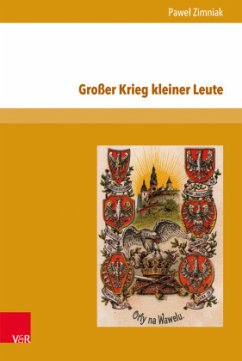Literary texts in Polish literature written between 1914 and 1920 combine specific meaningful strategies and serve as a medium for transporting collective memories. In them, collectively important places of remembrance are constructed and established in the context of power struggles, interests and group-related needs for meaning. This book focuses on authors like Roman Hernicz, Juliusz Kaden-Bandrowski, Zofia Nalkowska, Edward Slonski, Andrzej Strug, Kazimierz Tetmajer and Stefan _eromski, who explicitly or implicitly discuss World War II themes in their work. They present both realistic and critical perspectives on the events and processes of the "Great War" juxtaposed against proleptic, irredentist, patriotic and pathetic points of view.
Bitte wählen Sie Ihr Anliegen aus.
Rechnungen
Retourenschein anfordern
Bestellstatus
Storno








